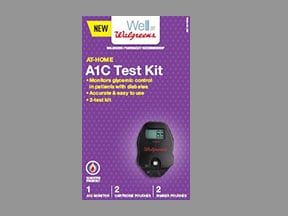
A1c Test At-home Coupons & Savings Card – Discount Prices from $34.79
My prescription
Edit
1, A1c Test At-home (1 Kit)
Select pharmacy

Albertsons
$34.79
COUPON PRICE
Walgreens
$34.79
COUPON PRICEA1c Test At-home savings card
Show this card to your pharmacist
Albertsons
$34.79
BIN
ID
PCN
GRP
011867
LHFA3F631B
HT
LABH001
Powered by
Price history for A1c Test At-home
1 Kit, 1nan
Average retail price for A1c Test At-home
Average SaveHealth price for A1c Test At-home
Our price history data is based on aggregated prescription data collected from participating pharmacies in America. Our prescription data updates daily to reflect the latest price changes. If you notice a missing data point, it means there wasn't sufficient data available to generate a monetary value for that date.
*Retail prices are based on pharmacy claims data, and may not be accurate when we don't have enough claims.
A1c Test At-home dosage forms
Dosage Quantity Price from Per unit 1nan 1 Kit $36.59 $36.59
| Dosage | Quantity | Price from | Per unit |
|---|---|---|---|
| 1nan | 1 Kit | $36.59 | $36.59 |
A1c Test At-home Warnings
At-home A1C tests offer a convenient way to monitor average blood sugar levels over the past two to three months. However, it's important to be aware of certain risks associated with their use.
Accuracy Concerns: While many at-home A1C tests are designed to be user-friendly, their accuracy can vary. Factors such as improper sample collection, device calibration issues, and individual health conditions can lead to results that differ from those obtained in a clinical setting. For instance, conditions like anemia, kidney disease, or certain blood disorders may affect the reliability of A1C readings.
Misinterpretation of Results: Without professional guidance, there's a risk of misinterpreting test outcomes. An inaccurate reading might lead to unnecessary anxiety or a false sense of security, potentially resulting in inappropriate adjustments to diabetes management plans.
Potential for False Readings: Certain health conditions, such as sickle cell anemia or recent blood transfusions, can cause false A1C readings. These inaccuracies may lead to misdiagnosis or mismanagement of diabetes.
Lack of Comprehensive Analysis: At-home tests provide a snapshot of average blood sugar levels but don't offer the detailed insights that come from a full panel of tests conducted in a clinical environment. Relying solely on at-home A1C tests may overlook other important health indicators.
Storage and Handling Issues: Improper storage or handling of test kits can compromise their effectiveness. Exposure to extreme temperatures or using expired kits may lead to inaccurate results.
To mitigate these risks, it's advisable to use at-home A1C tests as a supplementary tool rather than a replacement for regular consultations with healthcare professionals. Always discuss your at-home test results with your doctor to ensure accurate interpretation and appropriate management of your health.
A1c Test At-home Side Effects
At-home A1C tests are generally safe and convenient for monitoring blood sugar levels over time. The primary physical sensation involved is a small finger prick to obtain a blood sample, which may cause brief discomfort similar to a sharp scratch. While the procedure is minimally invasive, some individuals might experience mild bruising or tenderness at the puncture site, which typically resolves within a few hours. In rare cases, individuals may feel lightheaded or faint during or after the blood draw, especially if they are anxious about the procedure or have a history of dizziness during blood tests. To minimize this risk, it's advisable to be seated during the blood collection process. It's important to note that certain health conditions can affect the accuracy of A1C test results. Conditions such as anemia, kidney disease, liver disease, or the presence of different hemoglobin variants can lead to false readings. Therefore, individuals with these conditions should consult with a healthcare professional before using at-home A1C tests. Additionally, these tests are not recommended for pregnant women and young children. To ensure safety and accuracy, always follow the test kit's instructions carefully, use the provided lancet, and avoid sharing the device with others to prevent cross-contamination. If you have any concerns or experience unusual symptoms after testing, seek medical advice promptly.
A1c Test At-home Interactions
When using at-home A1C test kits, it's important to be aware that certain factors can influence the accuracy of your results. While these tests are generally reliable, some conditions and substances may affect their precision.
For instance, conditions like pregnancy, rheumatoid arthritis, and blood disorders such as sickle cell disease, anemia, recent transfusions, or significant blood loss can impact A1C readings. These factors may lead to results that don't accurately reflect your average blood sugar levels.
Additionally, some medications and supplements might interfere with blood glucose measurements. Although this is more commonly associated with daily blood glucose monitoring devices, it's still advisable to consult with your healthcare provider about any potential interactions that could affect your A1C test results.
To ensure the most accurate readings, always follow the test kit's instructions carefully. If you have any concerns about factors that might influence your results, discuss them with your healthcare provider. They can provide guidance tailored to your specific health situation and help interpret your A1C readings accurately.
Is the at home A1C test accurate?
At-home A1C tests can provide a general indication of a person's average blood sugar levels over the past two to three months. However, they may not be as accurate as tests conducted in a clinical setting. Factors such as improper sample collection, storage, and handling can affect the results. It is recommended to use these tests as a supplementary tool and to consult with a healthcare provider for more accurate and comprehensive testing.
Using the SaveHealth discount card, what is the price of A1c Test At-home without insurance?
Using the SaveHealth discount card, the price of A1c Test At-home without insurance is $34.79.
What is the price of A1c Test At-home at Walgreens?
The price of A1c Test At-home at Walgreens is $34.79.
